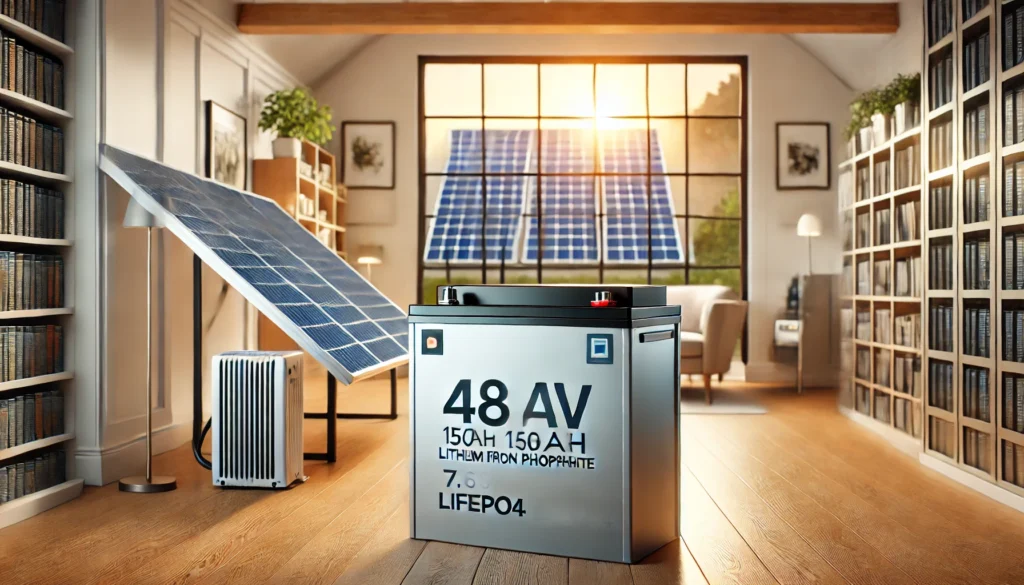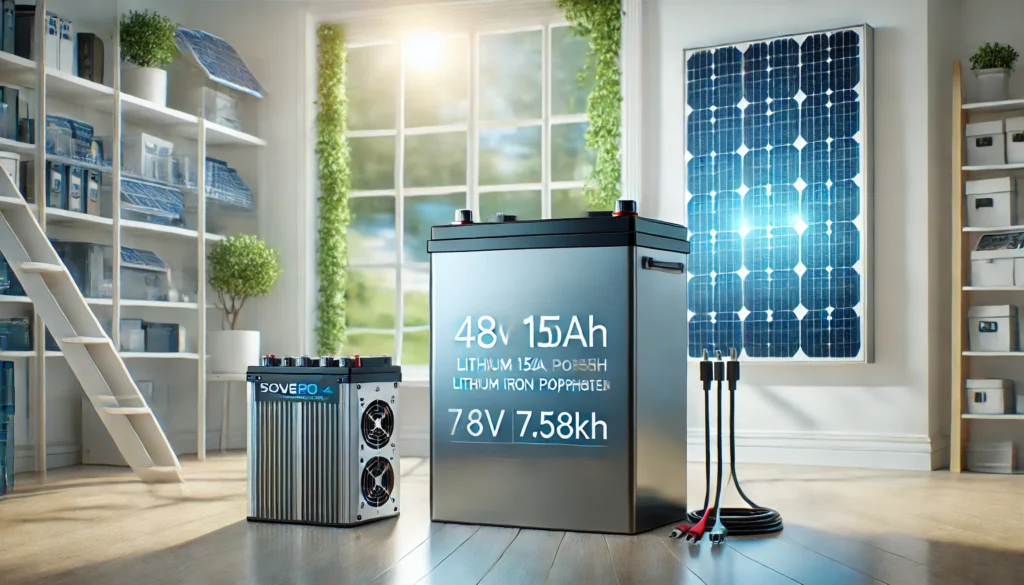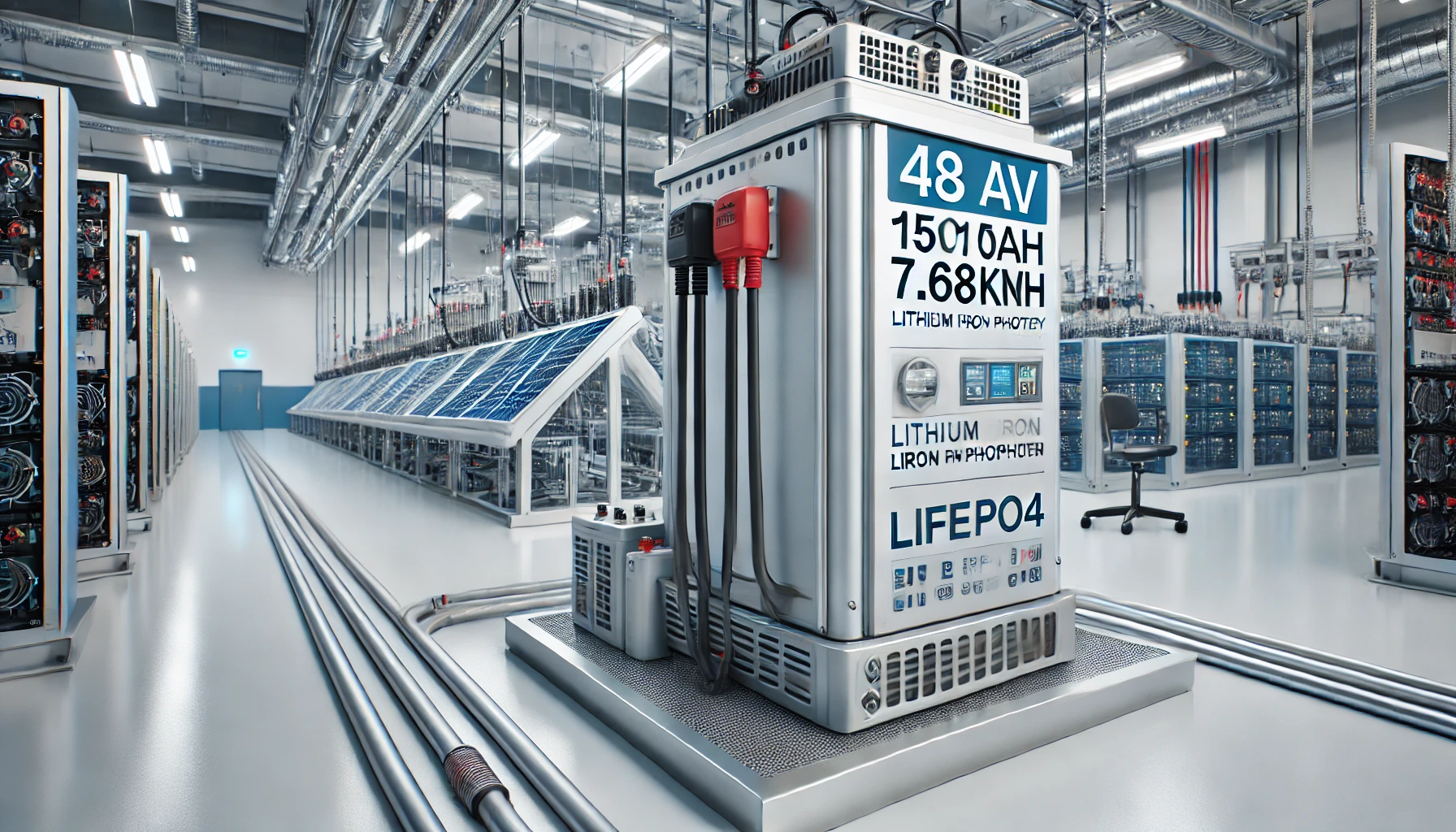The 48V 150Ah 7.68kWh Lithium Battery LiFePO4 (Lithium Iron Phosphate) has emerged as one of the most efficient and reliable battery solutions available for modern energy storage needs.
Whether for solar energy systems, electric vehicles (EVs), recreational vehicles (RVs), or industrial applications, this powerful battery offers excellent performance, long lifespan, and a significant energy capacity.
This article will provide an in-depth exploration of the 48V 150Ah 7.68kWh Lithium Battery LiFePO4, explaining its features, benefits, safety considerations, and how it compares to other energy storage options.
Understanding LiFePO4 Batteries
What is LiFePO4?
LiFePO4 stands for Lithium Iron Phosphate, a type of lithium-ion battery chemistry known for its safety, long cycle life, and stable performance. Compared to other lithium-ion chemistries like Lithium Nickel Manganese Cobalt (NMC), LiFePO4 batteries have a lower energy density but offer several advantages in terms of safety and longevity.
The 48V 150Ah 7.68kWh battery, specifically, uses this technology to provide reliable energy storage with a long lifespan and minimal risk of overheating or catching fire.
Advantages of LiFePO4 Over Other Lithium-Ion Batteries
- Longer Cycle Life: LiFePO4 batteries are known to last between 3,000 and 6,000 full charge cycles, much longer than traditional lead-acid batteries, which typically last 500-1,000 cycles.
- Safer Chemistry: LiFePO4 is thermally stable and non-toxic, reducing the risks of fire or thermal runaway when compared to other lithium-ion battery types.
- Better Efficiency: LiFePO4 batteries offer higher charge and discharge efficiency, meaning they provide more usable energy from the same amount of storage.
- Environmentally Friendly: LiFePO4 batteries are more sustainable as they are made from less harmful materials than other battery chemistries, which makes them easier to recycle.
Environmental Impact and Sustainability
LiFePO4 batteries are considered more eco-friendly than other lithium-ion batteries because they use iron and phosphate, which are abundant and less harmful to the environment compared to cobalt or nickel.
Additionally, the long life cycle of these batteries reduces the need for frequent replacements, further minimizing environmental impact.
Technical Specifications of 48V 150Ah 7.68kWh Lithium Battery LiFePO4

The 48V 150Ah 7.68kWh lithium battery provides a substantial amount of energy storage with a nominal voltage of 51.2V, offering 7.68 kilowatt-hours (kWh) of usable energy.
This energy capacity is ideal for a variety of applications, from powering home appliances to supporting solar energy systems. Below are some key specifications:
- Nominal Voltage: 51.2V
- Capacity: 150Ah
- Energy Capacity: 7.68kWh
- Battery Management System (BMS): Ensures safe operation by protecting the battery from overcharging, over-discharging, short circuits, and thermal imbalances.
- Weight: Approximately 135.6 lbs (61.5 kg)
- Dimensions: 19.27 x 7.55 x 20.27 inches (49 x 19 x 51.5 cm)
Energy Density and Efficiency
The 48V 150Ah LiFePO4 battery has a high energy density, making it more efficient than traditional lead-acid batteries. This means it can store more energy in a smaller space.
When used in applications like solar energy storage, this efficiency translates to better performance and lower space requirements.
Cycle Life and Longevity
One of the standout features of LiFePO4 batteries is their impressive cycle life. This battery can withstand up to 6,000 charge and discharge cycles before its capacity drops below 80% of its original rating. This makes the 48V 150Ah 7.68kWh battery an excellent long-term investment.
Safety Features and Battery Management Systems (BMS)
Safety is a top priority when it comes to lithium batteries. The 48V 150Ah 7.68kWh LiFePO4 battery includes a Battery Management System (BMS) to monitor the battery’s performance and prevent safety hazards. The BMS protects against:
- Overcharging: Prevents damage by ensuring the battery is charged within safe limits.
- Over-discharging: Stops the battery from discharging too far, which could damage the cells.
- Over-current and Short-circuit Protection: Ensures the battery can handle high-power loads safely.
- Thermal Management: Keeps the battery at an optimal temperature for efficient performance.
Applications of 48V 150Ah 7.68kWh LiFePO4 Batteries
The versatility of the 48V 150Ah 7.68kWh LiFePO4 battery makes it suitable for a wide range of applications.
Residential Energy Storage
This battery is a popular choice for homeowners looking to store solar energy for later use. With 7.68kWh of usable power, it can support essential home appliances during power outages or reduce electricity bills by storing excess energy during off-peak hours.
Solar Power Systems
In solar energy setups, the 48V 150Ah LiFePO4 battery can store energy generated during the day and provide power at night or during cloudy periods. This makes it an ideal component for off-grid solar systems.
Electric Vehicles (EVs) and RVs
The 48V 150Ah 7.68kWh battery is also used in electric vehicles (EVs) and recreational vehicles (RVs), where it powers motors and appliances while offering long-lasting, efficient energy storage.
Industrial and Commercial Uses
Businesses can benefit from these batteries for backup power solutions, reducing reliance on the grid, or for energy-intensive processes. Their scalability makes them a reliable option for small- and medium-sized enterprises.
Comparative Analysis

LiFePO4 vs. Lead-Acid Batteries
LiFePO4 batteries significantly outperform lead-acid batteries in terms of lifespan, efficiency, and safety. While lead-acid batteries typically last around 500-1,000 cycles, the LiFePO4 battery lasts up to 6,000 cycles, making it a more cost-effective long-term investment.
LiFePO4 vs. Other Lithium-Ion Batteries (e.g., NMC, NCA)
LiFePO4 batteries have a lower energy density compared to Nickel Manganese Cobalt (NMC) and Nickel Cobalt Aluminum (NCA) chemistries. However, LiFePO4 is much safer and more stable, making it ideal for applications where safety is a concern, such as residential energy storage.
Cost Analysis and Return on Investment
While LiFePO4 batteries generally have a higher upfront cost than lead-acid batteries, their extended lifespan and superior performance result in a lower cost per cycle, making them a better long-term investment.
Installation and Maintenance
Installation Guidelines
Proper installation is critical to the performance of the 48V 150Ah 7.68kWh LiFePO4 battery. It is recommended to consult with a professional installer to ensure that the battery is set up according to the manufacturer’s specifications and local electrical codes.
Maintenance Best Practices
Maintaining the battery is simple, as LiFePO4 batteries require little upkeep. Ensure that the battery is kept in a dry, cool environment to avoid overheating. Regularly check for signs of wear or damage to the BMS.
Troubleshooting Common Issues
If the battery fails to charge or provide power, check the BMS for error codes. Ensure that all connections are secure and that the battery is not exposed to extreme temperatures.
Safety Considerations
The 48V 150Ah LiFePO4 battery includes a Battery Management System (BMS) to protect against overcharging, over-discharging, and overheating. Always follow the manufacturer’s instructions for installation and use to maximize safety.
Future Trends and Innovations
As battery technology continues to evolve, we can expect even higher efficiency, longer lifespan, and improved safety features. Future developments may focus on better integration with renewable energy sources and smart grids.
FAQs:
How long will the 48V 150Ah 7.68kWh battery last?
The battery can last between 3,000 and 6,000 charge cycles, depending on usage and maintenance, making it a long-lasting option.
Can the 48V 150Ah 7.68kWh battery be used with solar power systems?
Yes, this battery is ideal for storing energy from solar panels for later use.
Is the 48V 150Ah 7.68kWh battery suitable for off-grid applications?
Yes, it is an excellent choice for off-grid energy systems due to its capacity and reliability.
How do I ensure the safety of the 48V 150Ah 7.68kWh battery?
Always use the built-in Battery Management System (BMS), ensure proper installation, and avoid overcharging or discharging the battery beyond its recommended limits.
What is the environmental impact of using a LiFePO4 battery?
LiFePO4 batteries are more environmentally friendly than other lithium-ion chemistries due to their use of non-toxic, abundant materials like iron and phosphate.
Can the 48V 150Ah 7.68kWh battery be used in series or parallel configurations?
Yes, the 48V 150Ah 7.68kWh battery can be connected in series or parallel to increase the voltage or capacity, respectively. When connecting batteries in parallel, ensure that they are of the same voltage and capacity to avoid imbalance. Consult the manufacturer’s guidelines for proper configuration to ensure optimal performance and safety.
How do temperature fluctuations affect the performance of the 48V 150Ah 7.68kWh battery?
Extreme temperatures can impact the efficiency and lifespan of the 48V 150Ah 7.68kWh LiFePO4 battery. High temperatures may cause the battery to overheat, reducing its lifespan, while cold temperatures can lower the available energy and performance. It is essential to install the battery in a temperature-controlled environment to optimize performance and longevity.
Is the 48V 150Ah 7.68kWh battery maintenance-free?
While LiFePO4 batteries require minimal maintenance compared to lead-acid batteries, they are not entirely maintenance-free. Routine checks of the Battery Management System (BMS), ensuring proper ventilation, and keeping the battery clean and dry will help extend its lifespan and performance.
What is the warranty period for the 48V 150Ah 7.68kWh lithium battery?
The warranty for LiFePO4 batteries typically ranges from 5 to 10 years, depending on the manufacturer. It’s essential to check the specific warranty terms to understand what is covered, such as defects in materials or workmanship, and the battery’s performance over time.
Can the 48V 150Ah 7.68kWh battery be used to replace traditional lead-acid batteries in an existing system?
Yes, the 48V 150Ah 7.68kWh LiFePO4 battery can be used as a direct replacement for lead-acid batteries in existing systems. However, due to the differences in charging profiles between lead-acid and LiFePO4 batteries, you may need to adjust or replace your charging equipment to ensure compatibility and optimal performance.
Conclusion:
In conclusion, the 48V 150Ah 7.68kWh Lithium Battery LiFePO4 is an excellent choice for a variety of applications, offering reliable power storage with a long lifespan, superior safety features, and excellent efficiency.
Whether you are looking to power your home, solar system, or vehicle, this battery will provide the energy needed with minimal maintenance and maximum performance
recommend article:
Shumai Nedir – Kökeni, Çeşitleri, Besin Değerleri Ve Evde Yapımı!
Myfastbroker.Com – Your Ultimate Guide To Finding The Right Financial Broker!
Comprehensive Guide To Blogsternation.Com – Your Ultimate Blogging Companion!




